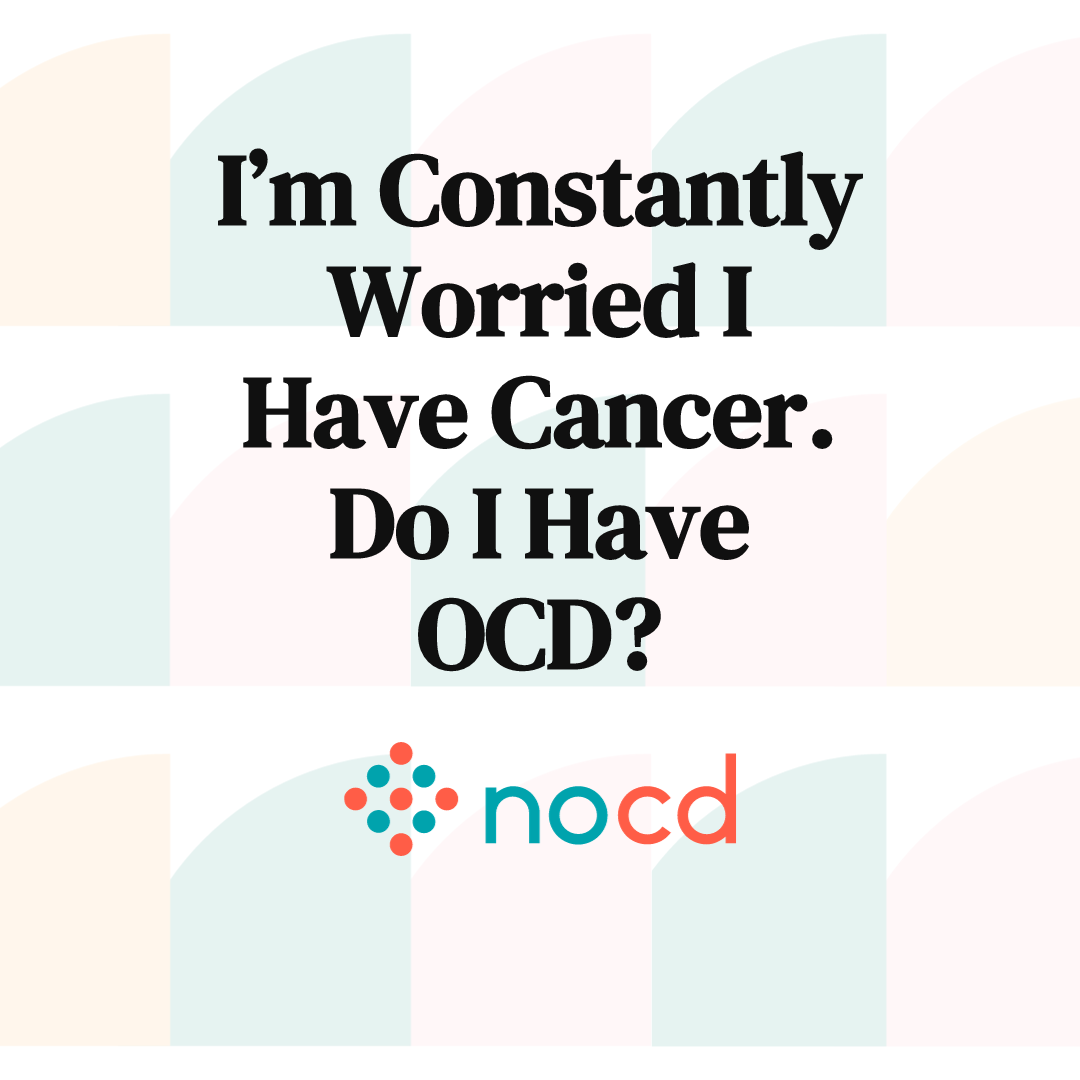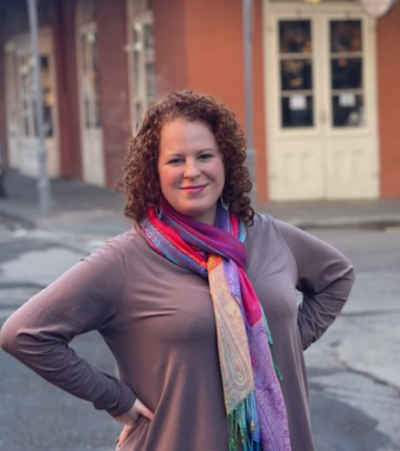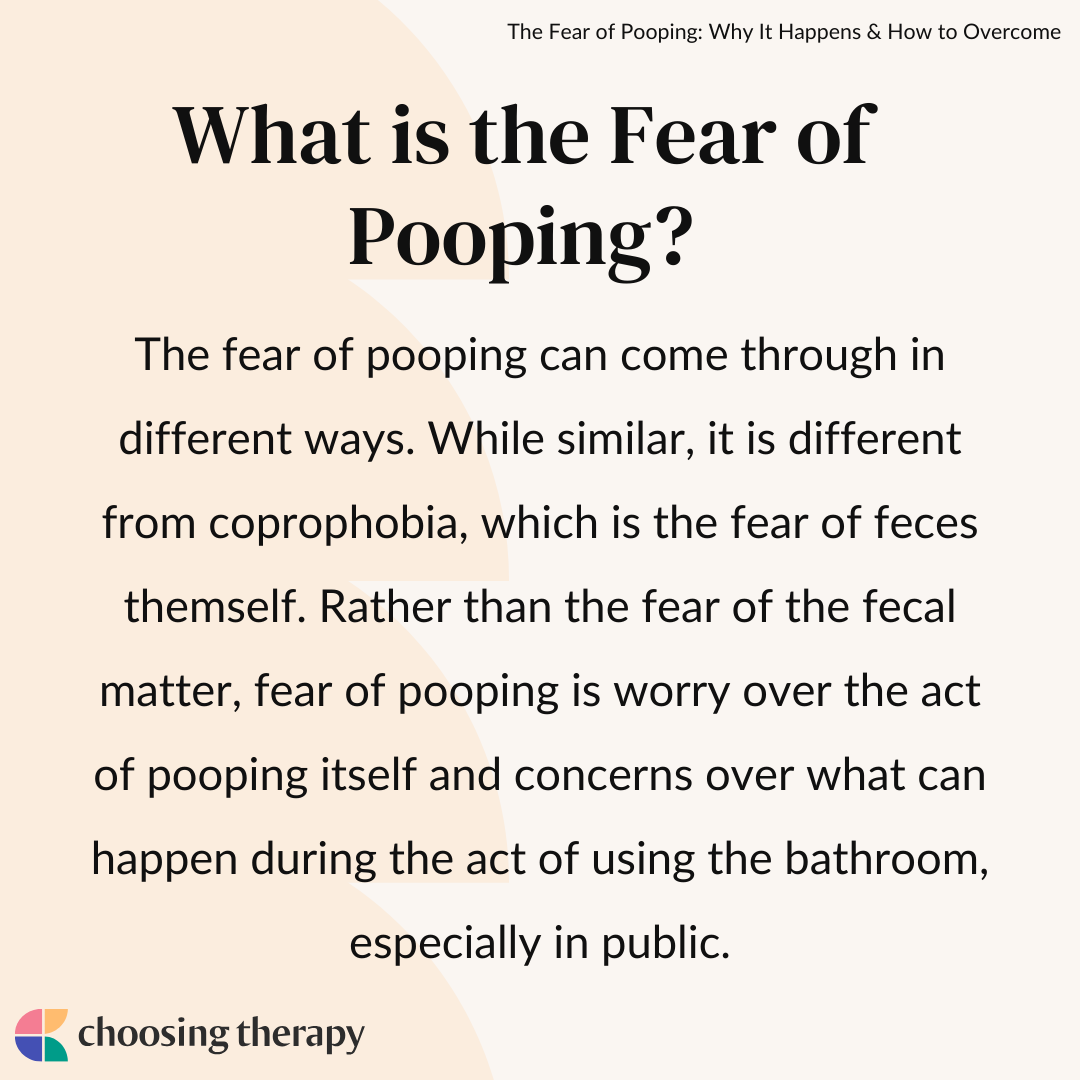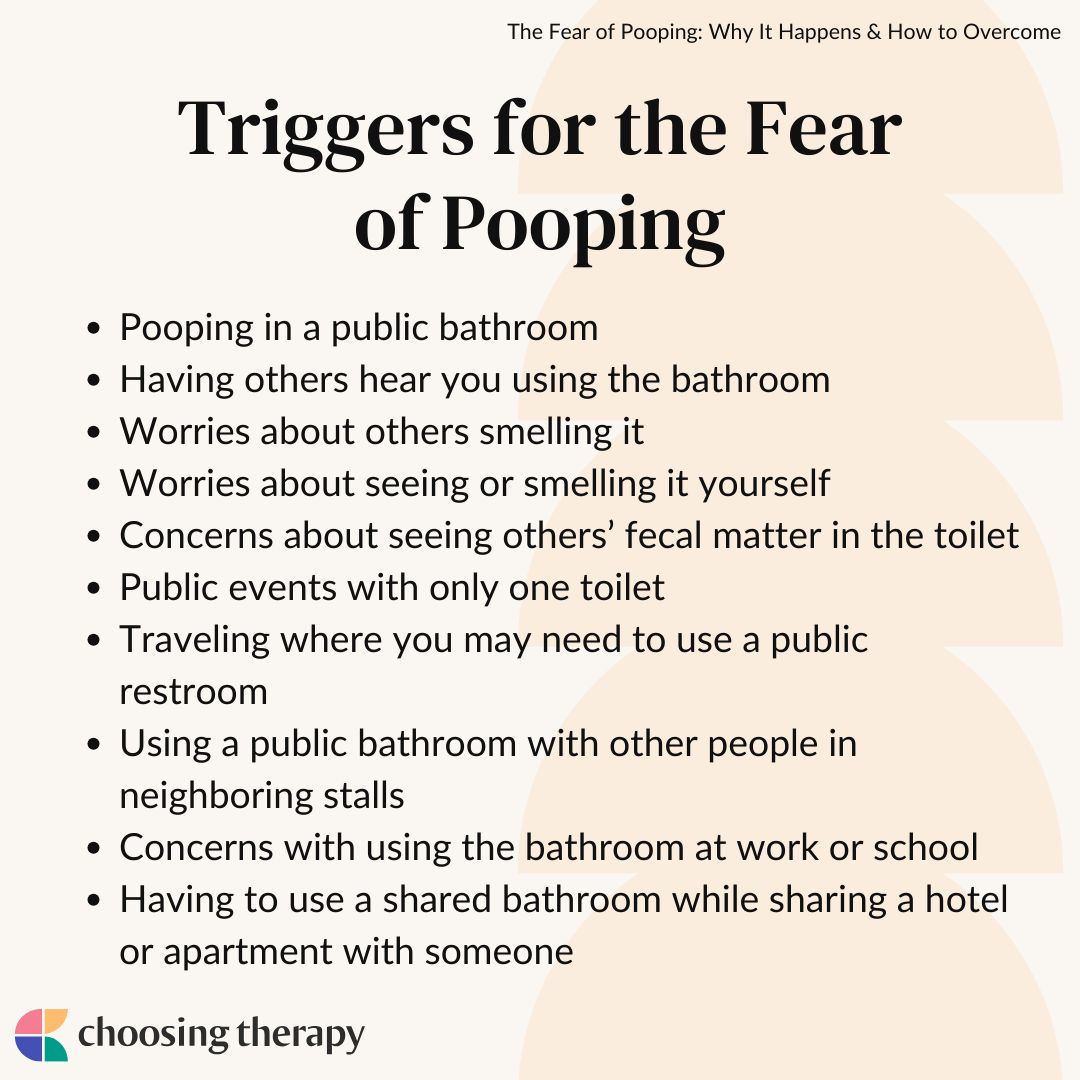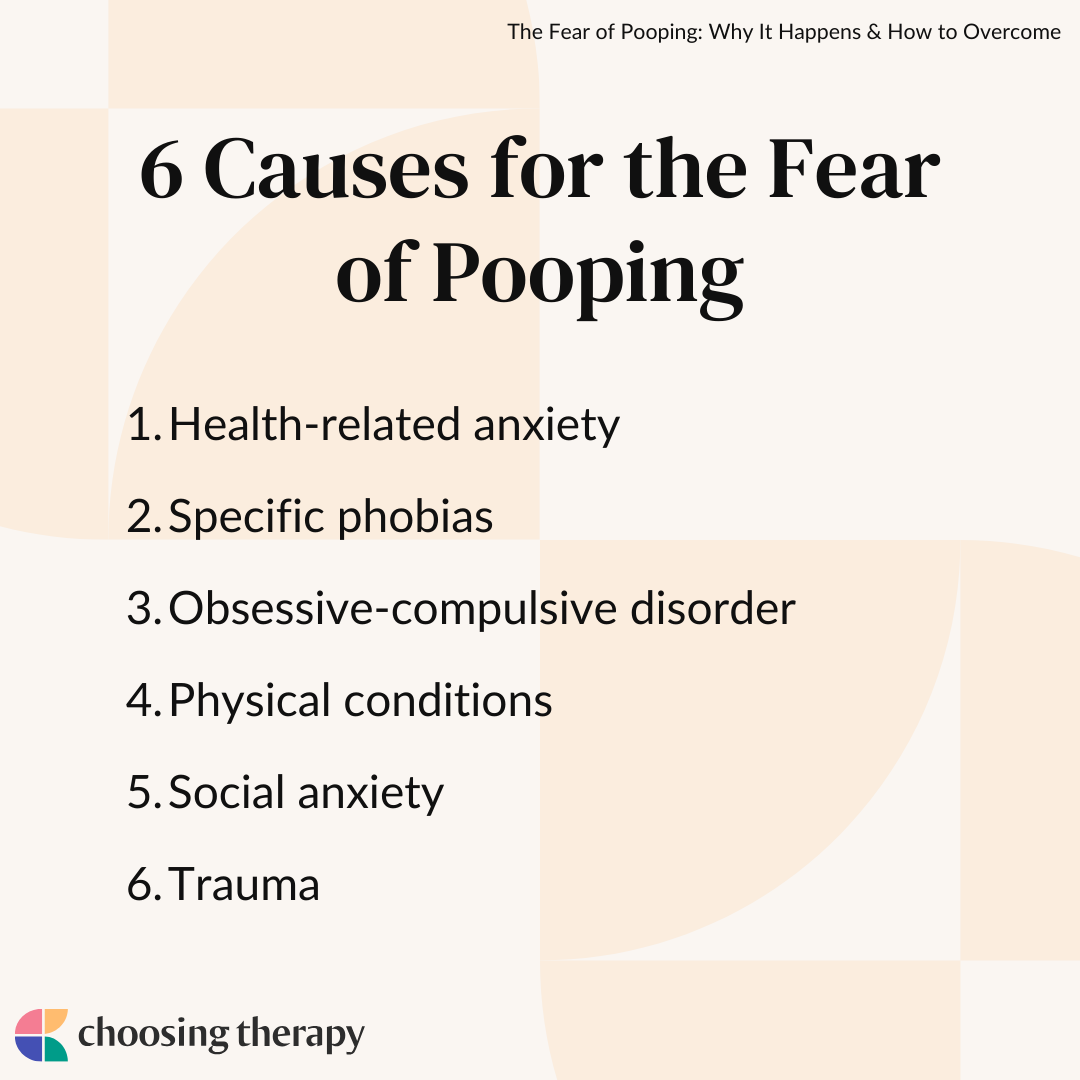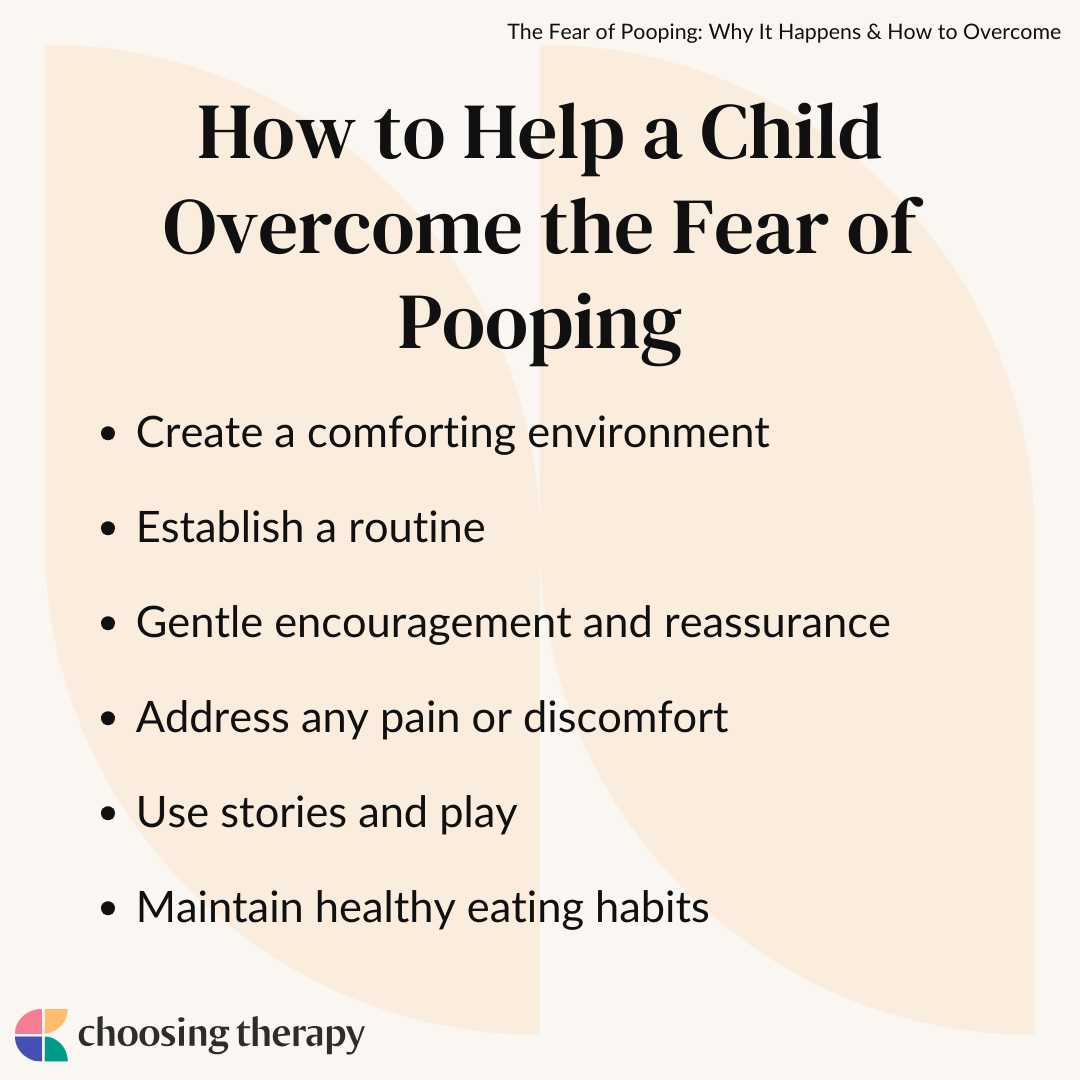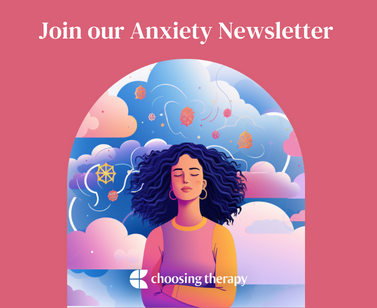The fear of pooping can manifest a few different ways, such as a fear of pooping in a public place such as a public bathroom, or the fear of the act of pooping itself, which can manifest as worries about seeing one’s own- or even someone else’s- fecal matter.
Find a supportive therapist who can help with anxiety. BetterHelp has over 20,000 licensed therapists who provide convenient and affordable online therapy. BetterHelp starts at $65 per week. Take a Free Online Assessment and get matched with the right therapist for you.
What Is the Fear of Pooping?
The fear of pooping can come through in different ways. While similar, it is different from coprophobia, which is the fear of feces themself. Rather than the fear of the fecal matter, fear of pooping is worry over the act of pooping itself and concerns over what can happen during the act of using the bathroom, especially in public.
This fear can stem from various sources, and it manifests differently in adults and children. While children often do not understand what is happening and thus may act out when they need to use the bathroom, adults are usually able to handle the negative feelings better, although they are still anxious and distressed about the situation.
Triggers for the Fear of Pooping
Some common triggers for fear of pooping include worries about others in public smelling or hearing you using the bathroom, and thus wanting to avoid using the toilet in public.
Some common triggers for fear of pooping include:
- Pooping in a public bathroom
- Having others hear you using the bathroom
- Worries about others smelling it
- Worries about seeing or smelling it yourself
- Concerns about seeing others’ fecal matter in the toilet
- Public events with only one toilet
- Traveling where you may need to use a public restroom
- Using a public bathroom with other people in neighboring stalls
- Concerns with using the bathroom at work or school
- Having to use a shared bathroom while sharing a hotel or apartment with someone
6 Causes for the Fear of Pooping
Sometimes there are internal psychological processes that can lead to a fear of pooping, often linked with a fear of losing control. Because we have very little control over many of our body’s urges or needs, this can often provoke anxiety in those who struggle with not having control.
Six causes for fear of losing control include:
1. Health-Related Anxiety
Health-related anxiety can create fears associated with the act of pooping, such as concerns over cleanliness, germs, or contracting illnesses. If someone’s fear of pooping is due to fears of germs, they may find that using the bathroom at home is easier than going in a public restroom.
2. Specific Phobias
There are two different phobias associated with a fear of pooping, coprophobia and parcopresis. While coprophobia is the fear of feces, parcopresis refers to the fears of using the bathroom in public, often called “shy bladder” or “shy bowels.” Even though they are different, either one can result in a fear of pooping.1
3. Obsessive-Compulsive Disorder
There is a connection between obsessive-compulsive disorder (OCD) and the fear of pooping. For example, contamination OCD can involve compulsions or obsessive thoughts related to OCD cleanliness or contamination, which can make the act of pooping a source of significant anxiety and stress.
Common triggers experienced by people with a fear of pooping include:
- Fears of contamination
- Fears of leaving germs behind
- Fears of getting sick
- Fears of not being clean
Common obsessions experienced by people with a fear of pooping include:
- Concerns over being walked in on
- Worries over germs
- Concerns over leaving marks or smells in the bathroom
- Fear of being listened to while they use the bathroom
Common compulsions experienced by people with a fear of pooping include:
- Washing hands excessively
- Spraying perfume or bathroom spray to mask smell
- Flushing the toilet multiple times to get rid of evidence
- Checking to see if anyone is in stalls next to them
- Trying to find a bathroom without anyone around
4. Physical Conditions
Having negative physical experiences while pooping can heighten fear or anxiety about using the bathroom. For example, if you have a history of uncomfortable gas pains or constipation, you may have concerns about using the bathroom due to associating it with pain and discomfort.
Physical conditions that can cause a fear of pooping include:
- Chronic constipation
- Painful bowel movements
- Hemorrhoids
- Irritable bowel syndrome (IBS)
5. Social Anxiety
Social anxiety can lead to fear of pooping due to concerns over others being present when you are using the bathroom. This could be the reason if you find that you have anxiety only when using public restrooms, using someone else’s bathroom, or when a partner or guest is present.
6. Trauma
Past traumatic experiences related to toileting can affect present anxiety or concerns around pooping. Public embarrassment, bathroom-related abuse, or severe medical issues involving bowel movements can lead to a persistent fear of pooping.
Options For Anxiety Treatment Talk Therapy – Get help from a licensed therapist. Betterhelp offers online therapy starting at $65 per week. Free Assessment Psychiatry for Anxiety – Looking for anxiety treatment that prioritizes you? Talkiatry can help. Find an in-network psychiatrist you can see online. Get started with our short assessment. Visit Talkiatry
Causes of the Fear of Pooping in Children
Children might develop a fear of pooping due to potty training challenges or negative bathroom experiences. Young children who do not understand bodily processes may have a fear of losing a part of themselves.
Potty Training & Early Childhood Experiences
Early childhood experiences during potty training can contribute to this fear, especially if the potty training was traumatic such as experiencing punishment or abuse.
How to Know What Is Causing Your Fear of Pooping
Pinpointing the specific triggers and underlying causes of one’s fear of pooping is important to determining what to do for a solution.
Here are some strategies for how to learn what is causing your fear of pooping:
Identify Triggers
If you have a fear of pooping but are unsure where it stems from, there are some ways to track when and where they feel the fear of pooping.
Here are some questions to get a better sense of what is causing your fear of pooping:
- Do you worry about others hearing you?
- Do you worry about being made fun of?
- Are you concerned about the smell?
- Are you worried about others knowing you are pooping?
- Do you experience any discomfort when using the bathroom?
- Are you concerned with germs or passing on germs?
Professional Evaluation
If you or your children are struggling with toileting anxiety due to fears of the experience or due to physical discomfort, it is important to seek professional help for an evaluation. Support from therapists and counselors can assist in uncovering deep-seated causes of perfectionism, such as past trauma or mental health disorders.
Identifying Physical Health Concerns
Physical concerns should be attended to if they are causing bathroom anxiety. Consulting with a healthcare provider, such as a gastroenterologist, can help identify if physical conditions are contributing to the fear.
How to Overcome the Fear of Pooping
Overcoming the fear of pooping is possible with the right approach and support. While the strategies may vary based on the underlying cause of the fear, ultimately it is important to have understanding and compassion for yourself.
Would you like to have less fear and anxiety? Therapy can help. BetterHelp has over 20,000 licensed therapists who provide convenient and affordable online therapy. BetterHelp starts at $65 per week. Take a Free Online Assessment and get matched with the right therapist for you.
Here are some tips for how to overcome the fear of pooping:
Therapy & Counseling
There are some therapy options that are effective for dealing with a fear of losing control. If your fear of pooping is due to self-esteem such as worries about others hearing or smelling you using the bathroom, cognitive behavioral therapy or group therapy may help.2
If your fear of pooping is due to phobias such as germaphobia, or traits of obsessive compulsive disorder, then therapy modalities such as exposure and response prevention (ERP) may help.2
Gradual Exposure
Sometimes anxiety over pooping can be helped with gradual exposure. This process is often done by gradual steps of the process, starting with imagining the act of pooping and what that feels or sounds like. Next, slowly progress to sitting on the toilet.3
Even if you only sit down for a few seconds, or even if you sit for a couple minutes without using it, the act of sitting on the toilet can help with desensitization and exposure. Eventually, the last step is actually pooping on the toilet. This method can be particularly effective for those with severe anxiety or phobias.4
Medical Treatment for Physical Conditions
If the fear is related to physical discomfort or conditions like constipation or IBS, it is important to seek medical treatment. Because many people fear the discomfort associated with using the bathroom, this can lead to anxiety. Alleviating physical discomfort can significantly reduce anxiety around pooping.
Lifestyle Modifications
If your fear of pooping stems from discomfort or irregularity, simple lifestyle modifications can sometimes help. Lifestyle changes such as a high-fiber diet, adequate hydration, and regular exercise can ease bowel movements and reduce physical discomfort associated with pooping.
How to Help a Child Overcome the Fear of Pooping
There are many challenges parents and caregivers face when a child is afraid of pooping. Ultimately, maintaining understanding, patience, and a supportive approach will be the best tools in helping children overcome this fear.
Here are some tips for how to help a child overcome the fear of pooping:
- Create a comforting environment: Creating a calming environment can help a child decrease any anxiety or concern about being in an uncomfortable space. Some examples are to provide a step stool, use a child-sized toilet seat, or have calming scenery in the bathroom.
- Establish a routine: Many people find that their body naturally gets into a routine for when they need to use the toilet. Children can benefit from this routine as well, both for helping to remind them to go but also for decreasing anxiety about unexpected bathroom needs. One suggestion is to set specific times for bathroom breaks, or make it a household habit to use the bathroom immediately before bed.
- Gentle encouragement and reassurance: Positive reinforcement can help make a child feel that they are doing the right thing and decrease some of the fears associated with using the bathroom
- Address any pain or discomfort: It is important to address any pain when a child is using the bathroom, as this could indicate a medical issue. While occasional constipation is normal, anything other than occasional pain or discomfort may need a visit to a pediatrician.
- Use stories and play: Kids learn through storytelling, and it can also help their educational and psychological growth.5
There are many books available to normalize things such as body functions like passing gas or pooping. - Maintain healthy eating habits: Often our food and drink intake can lead to discomfort with pooping, such as leading to diarrhea or constipation. Making sure to eat a well balanced diet can help kids avoid bathroom anxiety.
When to Seek Professional Support
If you recently developed an increase in health related anxiety, or if this fear of using the toilet is a new experience for you, it might be time to seek professional help for the anxiety symptoms. You can find a therapist through an online therapist directory or an online search for someone who is licensed in your area.
In My Experience
To help our readers take the next step in their mental health journey, Choosing Therapy has partnered with leaders in mental health and wellness. Choosing Therapy is compensated for marketing by the companies included below. Talk Therapy Online-Therapy.com – Get support and guidance from a licensed therapist. Online-Therapy.com provides 45 minutes weekly video sessions and unlimited text messaging with your therapist for only $64/week. Get Started Psychiatry, with you in mind Talkiatry – Our Psychiatrists Can Diagnose Your Condition, Prescribe Medication, And Monitor Your Progress. Most psychiatry visits cost patients $30 or less* Free Assessment Anxiety Newsletter A free newsletter from Choosing Therapy for those impacted by anxiety. Get helpful tips and the latest information. Sign Up Learn Self Calming Techniques Mindfulness.com – Change your life by practicing mindfulness. In a few minutes a day, you can start developing mindfulness and meditation skills. Free Trial Choosing Therapy Directory You can search for therapists by specialty, experience, insurance, or price, and location. Find a therapist today. *Includes copayment, deductible, coinsurance, and $0 Visits. Excludes no shows.Additional Resources
I’m Constantly Worried I Have Cancer. Do I Have OCD? From time to time, it’s normal to worry about having cancer or any other illness. Many people wonder if they are sick or ill somewhat regularly, especially after an unexpected changes in how we feel or random twinge of pain. However, if your thoughts of having cancer are impacting your day-to-day activities, it may be a sign that you have OCD. Fear of Allergic Reactions Fear of having an allergic reaction involves intense and excessive concerns about eating certain foods or encountering certain situations in the environment (for example, seeing a bee). People who tend to suffer from this subtype of OCD find that these fears are extremely distressing and anxiety-provoking. People with allergy themes in OCD tend to think of worst-case scenarios that involve food allergies.